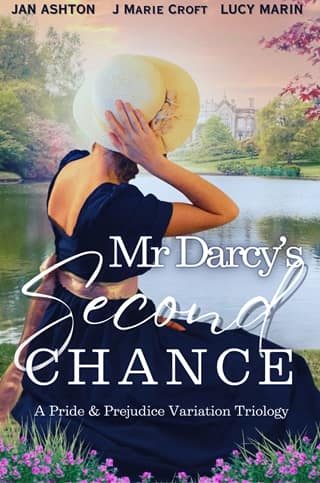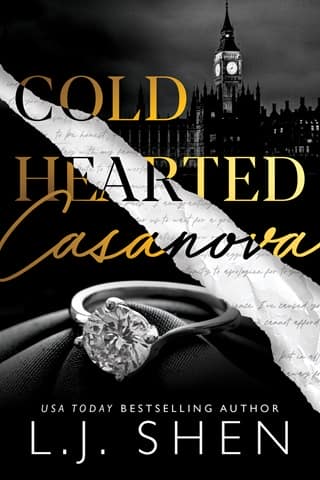Chapter 7
Seven
That afternoon, trapped inside by rain, Elizabeth took her book and sought refuge in her room, safely away from her family's spirited conversation in Longbourn's drawing room. Curled up in a yellow chair that gave her at least a semblance of the sun's warmth, she went over in her mind, for at least the third time, the mortifying events at Netherfield hours earlier. There, as a guest of the Bingley sisters, her mother had baited Mr Darcy by raising his past association with Mr Wickham and gloated as if Mr Wickham's fervent courtship of Jane had not been rushed and perhaps improper! Her family had exhibited no dignity—they had embarrassed themselves and embarrassed Jane. The Bingley sisters' disgust had been clear; they could not wait to rid themselves of the Bennets.
Worse, it was obvious that after the spectacle her mother and Lydia had performed, Mr Darcy felt only contempt for her family. Whether that extended to his feelings on Jane's engagement to Mr Wickham was unknown to her. However, he had not appeared either scornful or curious about it, and he was courteous to Jane. Whatever he knew of her came from Mr Bingley and the young Miss Darcy whom Jane had met in Ramsgate.
Mr Wickham would have them believe Mr Darcy to ooze malevolence and spite, but he had been well-mannered and reasonably pleasant under uncomfortable circumstances.
We cannot behave so ill towards a man we know only through contrary opinions. Mr Bingley calls on him for guidance and offers only praise for his character, while Mr Wickham refers to his cruelty, negligence, and conceit?
Elizabeth kicked at a spot on the rug. Much as it troubled her to doubt the word of her sister's soon-to-be husband, she did doubt it. She doubted him.
This morning's conversation with her father had given her little satisfaction. He had met her idea of a private conversation with Mr Darcy with stupefaction, if not a little anger. "Why, Lizzy, should I seek the word, let alone rely on it, of a man despised by Mr Wickham? You so little trust the good sense of both Jane and your father to think we have not sought to better understand the man she will marry?"
She withheld comment only to enquire, "Have you written to Mr Wickham and his solicitor and gained the detail needed for the settlement?"
Mr Bennet waved her away. "I should think I would have your trust as father to five young ladies who will seek to marry. All is in hand."
She kicked again at her carpet. It was an ugly green thing, laid in her room because Lydia had pitched a fit that she preferred blue and only Elizabeth had green eyes! Mrs Bennet had commanded a swap, and Lydia was pleased for a week—until she needed new hair ribbons to match her carpet.
It stood to reason that her mother and Lydia would be equally ridiculous in not understanding that speaking to Mr Darcy, and refraining from insulting him, was essential to learning more about Mr Wickham. But her father as well? Would he not wish to investigate such deep grievances, especially as they may affect Jane?
What had Mr Bingley said of Mr Darcy? ‘A good friend, better to me than nearly any other of his station, and a man I would entrust with my life.' He also complained—in a merry voice that made clear he was mocking himself—that Mr Darcy was too clever, with a plenitude of deep thoughts and long words. She had heard few words—long or short—from Mr Darcy, but this morning, he had gamely withstood being the subject of many less-than-gracious ones aimed at him.
Elizabeth was not drawn to Mr Bingley for more than light-hearted conversation, but he was pleasant company, open and eager to have others think well of him. In that, he was no different from Mr Wickham, but otherwise the two men were dissimilar. Mr Bingley exhibited a genuine, heartfelt manner, while Mr Wickham was quick-witted and preferred to lead a conversation or be at the centre of it rather than sit back and listen. In his quiet moments, he gazed adoringly at Jane. Yet as much as Mr Wickham enjoyed his own voice, Elizabeth realised she knew much more of Mr Bingley than she did of the man who would be her brother. Mr Wickham's name and particulars had been known to her for a month, but did she know him only as he wished to be known? More importantly, did Jane know and understand him? Mr Bennet, who had long enjoyed Sir William's puffery, had rolled his eyes a bit at Mr Wickham's admittedly melodramatic tales, but if he had hesitations about the man's intentions and his future, he was keeping them well hidden from her.
Jane's reputation rested on Mr Wickham's goodness and the sincerity of his intentions—and whatever had occurred between them.
A few kisses, professions of love and assurances of security, a proposal…is it enough? Does he love Jane as a husband ought? Does she love him, or is she simply as overwhelmed by him as Mama seems to be?
That last worry brought Elizabeth back to her ruminations on Mr Darcy. He was, in looks, the opposite of both men. Where Mr Bingley and Mr Wickham were fair, with light eyes and quick grins, Mr Darcy was dark haired and dark eyed and appeared averse to levity—except when it came to the toppling of Lydia's cream cake. He had watched its progress with the same amused distraction as she had. While her own anticipation was overlaid with horror, Mr Darcy simply seemed diverted. She frowned, recalling Miss Bingley's expression of revulsion, before the memory of Mr Darcy's mirth-filled gaze returned. He had looked at her, hiding a smile, as if he knew she shared his amusement. How forward of him to think so—even if he was right. Elizabeth could then not help recalling how often in their two short meetings Mr Darcy's eyes had been fixed on her. She hardly knew how to suppose that she could be an object of admiration or interest to him, and yet that he should look at her because he disliked her was still more strange. No, perhaps he senses my curiosity and doubts.
Tapping her fingers on the never-opened book on her lap, her mind drifted towards an unfamiliar feeling she had yet to examine. When Jane had first met Mr Wickham in Ramsgate, had she felt the sudden tug of awareness towards him that Elizabeth felt upon setting eyes on Mr Darcy? A frisson of heightened sensitivity to his being, his words, his expressions? Elizabeth felt compelled to watch him, to notice his movements and gauge his thoughts. It was as if his very presence drew her attention. She could not help but worry she was as susceptible as her sister to a handsome man. She should be cautious. Whether he was a villain or a hero or an ordinary man, she could not be comfortable with it.
Mr Darcy knows far more of Mr Wickham than Papa or Jane may have learnt in their meetings and letters. Much as he may despise us, we need his help.
After two years with nary a handsome young gentleman arriving in Meryton, Mrs Bennet could not stop expounding on their good fortune. Jane had found her betrothed in Ramsgate, and now Mr Bingley's arrival had put Mrs Bennet in mind of further possible matches.
The arrival of Mr Darcy did not dampen her pleasure, but neither did she add him to her list of eligible young men, especially after the morning's less-than-admirable encounter. In fact, it appeared that meeting him and Mr Bingley unexpectedly had only heightened her own appreciation for the latter gentleman, for having set her mind on Kitty or Mary for the as yet unseen heir to Longbourn, she was decided on the future Mrs Bingley as well.
That evening, as most of the Bennet family settled in the drawing room after dinner, she turned her attention to Elizabeth, eyeing her speculatively, before finally resting her gaze on Lydia. "You are most like Mr Bingley. He is a lively sort of man who laughs easily but will give way to his wife, I think."
Relieved to be away from her mother's scrutiny, Elizabeth agreed quickly. "Oh yes, for he is well-practised ceding to his sisters' opinions."
Lydia protested her inclusion as a marital prospect. "Mr Bingley is jolly, but he is not for me. I wish to meet one of Mr Wickham's friends, especially those in the militia or the navy. They are likely as handsome as he, and a man in uniform is much more interesting than one who stands about and worries over his ledgers."
Kitty appeared prepared to argue the point, but Mary spoke first.
"A steady man with a steady income makes the best sort of husband," she intoned.
"Netherfield is only three miles away, Lydia," insisted Mrs Bennet. "You would be settled so near to us."
Jane coughed, drawing a worried look from her mother. "Perhaps Mr Bingley would prefer to choose his own wife, Mama."
"A month's engagement, and you are the expert," said Mrs Bennet. Her voice softened when she enquired whether Jane knew more about Mr Wickham's intended return to Longbourn. Jane shook her head and looked at her father, hidden behind his newspaper.
"No, my dear," came a muffled voice.
"Well, I wish to ensure the finest roast is prepared when he arrives. Mr Bingley says there are no birds anywhere. Mr Bennet, have you heard about a shortage of partridge?"
"No, my dear."
Elizabeth observed Jane, intent on embroidering a handkerchief for Mr Wickham. She had grown quieter these past few days, especially on the topic of Mr Wickham or his arrival. Her sister's thoughts seemed far away as she jabbed a needle into the cloth to create a badly formed ‘G'. Or was it a ‘C'?
A small suspicion unfurled: Does Jane have feelings for Mr Bingley? She likes him—she feels easier in his company than in Mr Wickham's. Who would not—Mr Bingley is exceedingly pleasant.
There was a sense of panic with the realisation. Jane was engaged. She was neither feckless nor faithless. It was incredible that she had met a man who so quickly professed love and wished to marry her. Had now she met another—far too late—in Mr Bingley?
And why is Mr Darcy the man who knows them both?
As was often the case, before Elizabeth could think further, her mother interrupted with a course of conversation far more vital to be shared.
"Lizzy, if Lydia is for Mr Bingley or one of Wickham's friends, then you could take on the larger, and obviously repellent, task of charming the disagreeable Mr Darcy. You have the will and the wits to handle such a difficult man, and your reward would be a large estate and a house in town."
"Mama, while I appreciate your trust in my charms and hope for my fate, we must treat Mr Darcy with courtesy. He is a gentleman and a friend to our new and very generous neighbours." Although her cheeks burned, Elizabeth added, more calmly, "You were perceptive to ask him about his long acquaintance with Mr Wickham."
Mrs Bennet looked pleased by the rare, and quite deliberately aimed, compliment. "He has done a great wrong to Mr Wickham, and if you were to ingratiate yourself with him, perhaps he would make good on the fortune owed to Mr Wickham. That would be ideal for Jane."
Underneath her white cap, Mrs Bennet's face became animated. "Of course, if you married him, we could never all be together. You could not bring him to Longbourn, not when Jane and Wickham are with us. But if you could restore amity and ensure Wickham receives his missing inheritance…"
Elizabeth rolled her eyes. "I could not bear anything that encourages such a separation from Jane."
Mrs Bennet nodded and appeared to be thinking up some other ridiculous scheme.
"Perhaps, rather than forcing Lizzy into marriage, Mr Darcy could enlighten us as to his side of the story." Mary's voice, flat and reasonable, broke through the uncomfortable silence.
Elizabeth gave her a grateful look. "Yes, Mama. We should host the Netherfield party for dinner. You could provide them the finest meal in Meryton, and we could learn a little more from Mr Darcy about his connexion to Mr Wickham."
Quickly enamoured of anything that allowed her to exhibit her excellent hosting skills, Mrs Bennet agreed. "Yes, perhaps it is best we warm to Mr Darcy and ensure he sees how well his former friend has done for himself."
As her mother continued to prattle on, Elizabeth felt her father staring at her, bemused. He has said not a word, not even one gibe at my mother. Would that he express any opinion or share any news of Mr Wickham!
An ensuing debate over Kitty's marital prospects drove Elizabeth to her chambers. The door soon was flung open; Jane entered, closed the door firmly behind her, and sat heavily on the bed.
"Oh Lizzy, can we all not be in harmony? Mr Wickham's former friend is Mr Bingley's good friend. How I wish they could all be happy companions."
Pistols at dawn is more likely. Knowing her sister's soft heart, Elizabeth suspected Jane's distress was prompted less by their mother's matchmaking schemes and more by the unhappiness and uncertainty her match had created within Longbourn.
Jane's pitying look only deepened Elizabeth's pique. "Truly, Lizzy, I am sorry for the troubles endured by Mr Wickham, but no man can be as bad as he claims of Mr Darcy."
It was an astonishing confession, and one Elizabeth was pleased to hear. She urged her carefully. "You believe Mr Wickham exaggerated the crimes against him?"
Jane looked bewildered before quickly shaking her head. "No…it is just… Miss Darcy was shy, but she spoke well of her brother and his many kindnesses to her. I believe they exchanged letters every day!"
That was uncommon behaviour; even Elizabeth had not roused herself to write a letter to Jane every day they were separated.
When Jane had returned from Ramsgate, Elizabeth had asked many questions about her acquaintance with Mr Wickham; she had cloaked her doubts and worries over the haste of the connexion with an uneasy joy. But she had made few enquiries about Jane's brief acquaintance with the young lady who introduced them; indeed, she had not given her another thought. Her previous lack of interest now set her curiosity afire. Did Miss Darcy play matchmaker and lead Jane to Mr Wickham? What was her role in any of this? It was truly curious—Mr Darcy's presence in Meryton, arriving so soon after Mr Wickham.
Elizabeth set down her hairbrush and leant closer to Jane. "Can you not ask Mr Darcy about his sister?"
Jane was emphatic in her refusal. "I believe Miss Darcy may not look fondly on our brief acquaintance nor wish her brother to know of it. After she introduced us to Mr Wickham, we were not in company with her. He said it was unwise to provoke her brother's wrath."
"His wrath? Surely that is an exaggeration!" Shaking her head in disbelief of her sister's guilelessness, she asked, "Do you believe Mr Darcy is aware of your connexion to his sister?"
Jane sat up and smoothed the counterpane around her; her desire for tidiness often overtook her in fraught moments. "I do not know, but he would not look favourably on how our acquaintance ended."
"Oh, Jane."
"Mr Wickham would not wish me to say anything to her brother that could injure her character. He says Mr Darcy is severe on her."
Elizabeth sat back and looked at Jane. "This is nonsensical. You told me only moments ago that Mr Darcy and his sister exchanged letters every day, and that she spoke fondly of him."
Jane looked stricken. "I believe silence is in everyone's best interest. Mr Darcy may not be aware of the acquaintance, and Mr Wickham would not wish to expose it." Her eyes dimmed, and she began to unpin her hair. "Mr Wickham called her proud, but I thought Miss Darcy's manners were genuine and she was sweet and shy. Not all fifteen-year-old girls have the brashness of our Lydia."
Elizabeth's smile reflected as much amusement as relief. At last, some true understanding! An heiress of only fifteen is undoubtedly more discreet and better protected than Lydia. "Thank goodness for that! Do you imply that Mr Wickham misrepresented her character?"
"Surely not. He may not know, or remember, her well. He is a man, after all, and more than a decade her senior."
"Her brother knows her best, and you will not address her welfare with him?"
"No." Jane, sounding as exasperated as Elizabeth had ever heard her, pulled another pin from her hair. "As I said, I do not wish to injure her reputation in his eyes. Although he is more pleasant than Mr Wickham claimed, you know that Mr Darcy can look quite stern."
Then, with an expression as close to mischievous as Jane could muster, she leant towards Elizabeth. "Did you see how he watched Lydia with her cream cake?"
Elizabeth smiled. "With the disgust curling her lip, I am surprised Miss Bingley held her tongue. I have no doubt she feels free to insult visitors and would have done so if not for the presence of Mr Darcy." She picked up her brush and began working through her sister's tangled tresses. "The only person who did not appear to notice the cream cake was Mr Bingley, as his eyes were on you."
"Lizzy—"
"Your beauty is such that you will always catch the eye of gentlemen. It will be easier to disregard their gaze when your husband is sitting beside you." Jane gasped as Elizabeth tugged at a snarl in her hair. "Will the settlement be complete soon? Papa says nothing to me—it is your marriage."
"Soon," Jane replied. "We shall be married before Christmas."
The vagueness of such a reply discomfited Elizabeth.
"You are certain of Mr Wickham? Truly certain you wish to marry him after such a short acquaintance?"
Jane turned away, cloaking her expression in a fall of pale hair. "Of course, we are engaged."
Elizabeth's doubts and fears for her sister, never far away, returned in full.
"Dear girl, if you will not speak to the fierce and haughty Mr Darcy, I shall be brave! After all, do you not owe his sister your thanks for introducing you to Mr Wickham?"
And does he not owe us the truth about his old friend?
 Fullepub
Fullepub 



